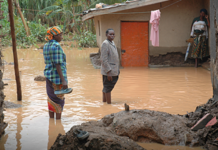Cabinet on Monday approved the National Health Insurance Scheme (NHIS) bill 2019. Health Minister, Dr. Jane Ruth Aceng described the move as ‘‘a great step forward for the health sector’’
The bill can now be gazetted and sent to parliament for debate, amendments and approval for enactment into law.
The National Health Insurance Bill seeks, among others, to lower the cost and improve the quality, safety, and efficiency of healthcare in Uganda. However, if passed into law, the Bill will make it mandatory for civil servants and formally employed Ugandans to make contributions to a National Social Health Insurance (SHI) Scheme.
It is envisaged that the NHIS will reduce catastrophic expenditure on health that leads to impoverishment of many households that cannot afford health care.
Since 2002, discussions on the bill have been in the process. 17 years of drafting, discussions and negotiations and engagements.
Last month, The Health State Minister in Charge of General Duties, Sarah Achieng Opendi told reporters in Kampala that it has taken government up to 12 years to come with the bill of what they think can draw consensus from different stakeholders, including employers on the issue of universal health insurance.
The Universal health insurance scheme means every Ugandan would be covered and wouldn’t need money to access health services and medicines in hospitals.
Ugandans spend a significant amount of their income on health, which means it diminishes their ability to save for other things.
What is currently available is private health insurance where only about 150,000 people out of the over 40 million Ugandans are insured. The small number is partly because many can’t afford the huge annual premiums that come with the service.
Currently, one needs about $25,000(about Shs90m) to cater for the cheapest kidney transplant in India which is the commonest destination for most Ugandans who seek treatment abroad.
The cost is, however, far beyond the $85 (about 303,709) income that Ugandans earn monthly on average, according to the Uganda National Household Survey Report 2009/2010.
As such, the scheme is expected to get rid of the constant media advertisements fundraising for life-saving operations out of the country.
In East Africa, Rwanda has significantly advanced universal health coverage with its community-based health insurance program under, which most of its citizens are covered.
The Ministry of Finance, issued a Certificate of Financial Implication for the National Health Insurance Scheme (NHIS) Bill in April 2017, allowing the Health Ministry to present the draft law before parliament for discussion. It was projected back then, that the scheme would start in in financial year 2018/2019.
According to the certificate, the government and private employees were to contribute 4 per cent of their monthly salary to the NHIS while employers would contribute 1 per cent of each employee’s monthly salary.
Self-employed individuals [ like Boda boda riders] are expected to pay 100,000 Shillings per year and pensioners to contribute 1 per cent of their monthly pension payment.
It further indicates that the government would continue to fund the provision of free health services in health facilities until every Ugandan is enrolled in the National Health Insurance Scheme.
Cabinet today approved the National Health Insurance Scheme bill 2019.
Since 2002,discussions on the bill have been in the process.
17 years of drafting, discussions and negotiations and engagements.
It's a great step forward for the health sector.— Dr. Jane Ruth Aceng (@JaneRuth_Aceng)

















































This will be a very good move for Ugandans let the MPs not even delay they should just hurry and present it for passing.